How to Recognize Early Signs of Illness in Chinchillas
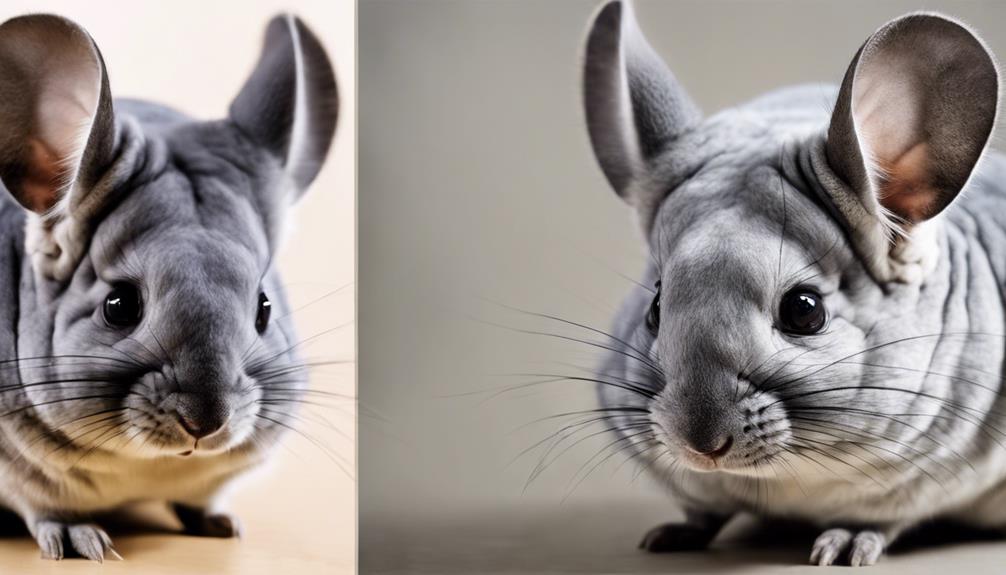
Early Signs of Illness in Chinchillas: How to Recognize Them.
Watch for changes in appetite and coat condition to ensure your chinchilla’s well-being.
Unusual Changes in Appetite
When a chinchilla experiences unusual changes in appetite, it may indicate an underlying health issue that requires prompt attention. Weight loss is a concerning sign that could point towards various health problems such as dental issues or gastrointestinal troubles. Chinchillas with dental problems may find it painful to eat, leading to a decreased appetite and subsequent weight loss. In severe cases, dental issues can also result in bloating due to improper chewing and digestion of food, which can further exacerbate the weight loss and lead to dehydration.
Chinchilla owners should be vigilant and monitor their pet’s eating habits closely. Any sudden changes in appetite should be promptly addressed by a veterinarian to rule out potential health issues. Regular dental check-ups are crucial for maintaining a chinchilla’s overall health and well-being. By being proactive and observant, chinchilla owners can help ensure their pets receive timely care and intervention to address any underlying health concerns related to changes in appetite.
Abnormal Stool Consistency
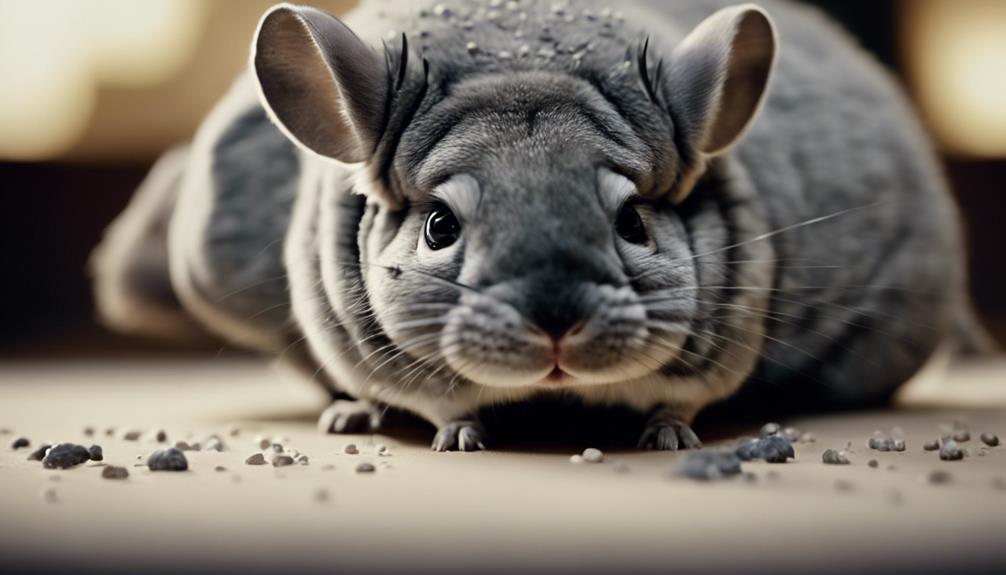
Chinchilla owners should be attentive to signs of abnormal stool consistency as it can indicate potential health issues requiring veterinary evaluation and intervention. Changes in stool consistency can be a crucial indicator of an underlying problem in chinchillas. It is essential to monitor your chinchilla’s droppings regularly to detect any abnormality early. Here are some key points to consider:
| Signs of Abnormal Stool Consistency | Potential Causes | Action Required |
|---|---|---|
| Soft or runny stools | Dietary adjustments | Monitor closely and consider changing the diet under veterinary guidance. |
| Hard, dry stools | Dehydration or lack of fiber | Ensure adequate water intake and offer more hay or fresh vegetables. |
| Presence of mucus or blood | Parasite infestation | Seek veterinary care for proper diagnosis and treatment. |
Dietary adjustments play a crucial role in maintaining healthy stool consistency. Providing a balanced diet rich in fiber is vital for chinchilla health. Additionally, regular parasite prevention measures can help avoid gastrointestinal issues. Remember, any persistent abnormality in stool consistency warrants prompt veterinary attention to ensure your chinchilla’s well-being.
Excessive Fur Loss
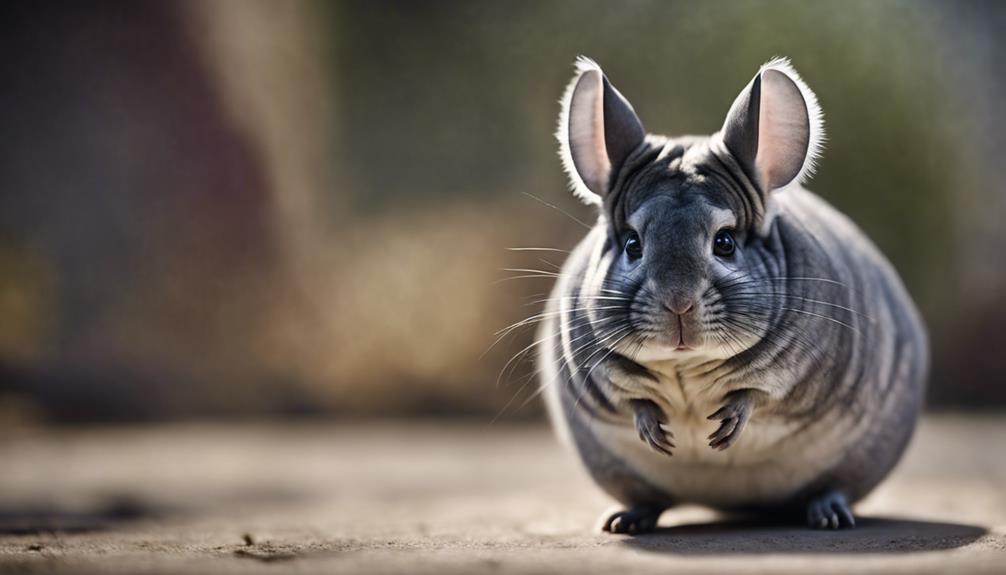
Experiencing excessive fur loss in chinchillas can signal underlying health issues that require prompt veterinary attention to ensure the well-being of your pet. When observing such a condition, it’s crucial to consider potential causes like skin irritation and changes in grooming habits.
Skin irritation could result from various factors such as fungal infections, parasites, or allergies. Chinchillas are susceptible to dermatophytosis, also known as ringworm, which can cause fur loss and skin lesions. Additionally, external parasites like mites can lead to intense itching, prompting the chinchilla to over-groom and subsequently lose excessive fur.
Changes in grooming habits, such as increased or decreased grooming, can also contribute to fur loss. Chinchillas are meticulous groomers by nature, and any deviation from their usual grooming routine may indicate an underlying issue. Stress, pain, or discomfort could disrupt their grooming behavior, leading to fur loss.
Monitoring your chinchilla’s fur condition regularly and seeking veterinary advice promptly if you notice excessive fur loss is crucial in maintaining your pet’s health and well-being.
Lethargy and Weakness
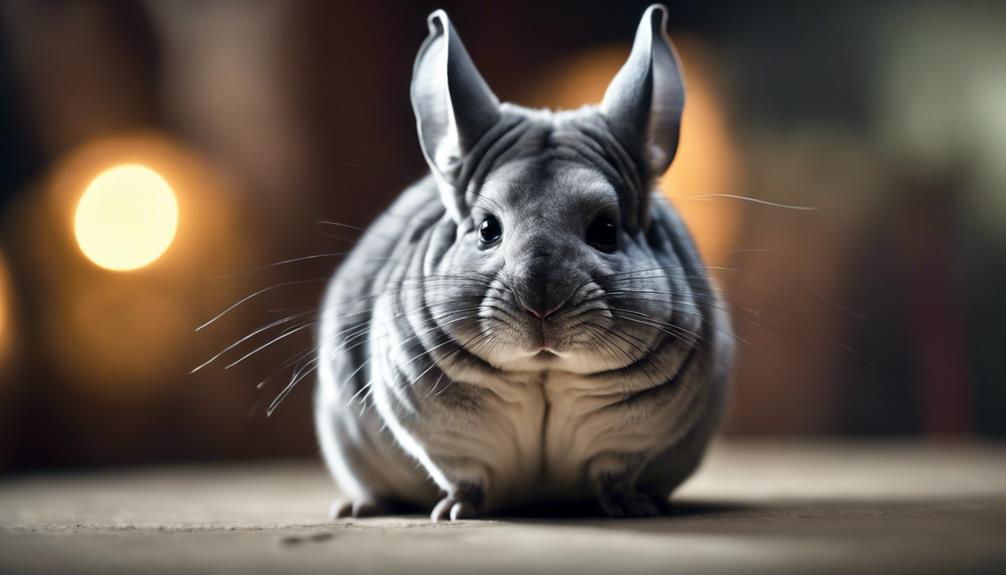
Observing signs of lethargy and weakness in chinchillas can indicate potential health concerns that require careful attention to ensure their overall well-being. Changes in their energy levels and sleep patterns are crucial indicators of their health status. A chinchilla that is lethargic may appear abnormally quiet, unmotivated to engage in activities, and could spend more time sleeping than usual. Weakness may manifest as difficulty moving around, reluctance to jump or climb, and a general lack of vitality. Monitoring these behaviors is essential to catch any health issues early on.
| Sign of Lethargy and Weakness in Chinchillas | Description |
|---|---|
| Decreased Activity Levels | Chinchilla showing reduced interest in play or exercise |
| Excessive Sleeping | Unusually prolonged periods of rest and inactivity |
| Reluctance to Move | Hesitation or struggle in performing usual movements |
| Lack of Enthusiasm | Diminished excitement or engagement in surroundings |
| Muscle Weakness | Noticeable lack of strength or agility |
Labored Breathing or Wheezing
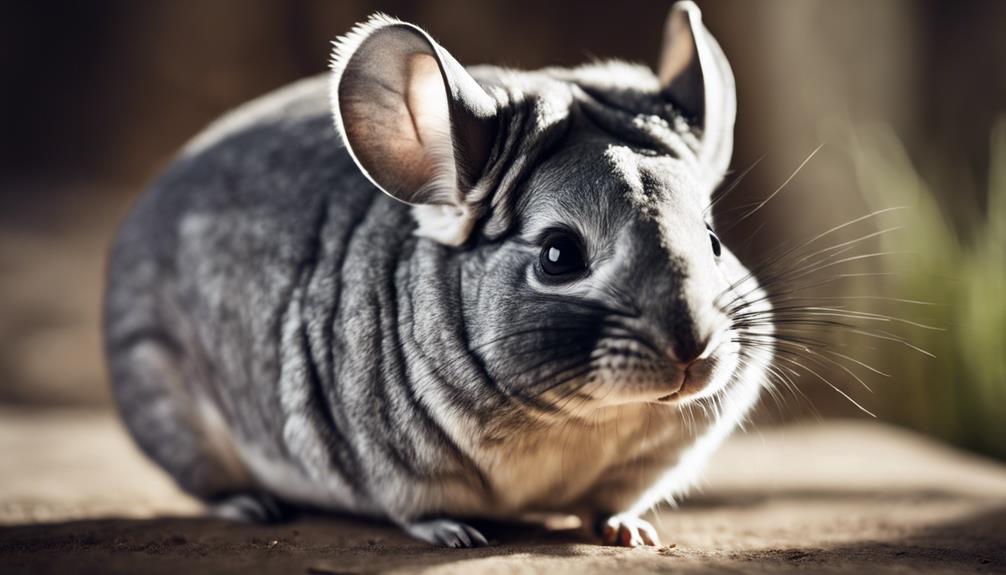
Labored breathing or wheezing in chinchillas can signal respiratory distress and necessitates prompt veterinary attention to address potential underlying health issues. Respiratory infections are a common cause of breathing difficulties in chinchillas. These infections can be caused by bacteria, viruses, or fungi and can lead to symptoms like labored breathing, wheezing, coughing, and nasal discharge.
To prevent respiratory infections, it’s crucial to maintain a clean environment for your chinchilla, with good ventilation and low humidity levels. If your chinchilla is experiencing labored breathing or wheezing, it’s essential to seek veterinary care immediately. The treatment for breathing difficulties in chinchillas often involves antibiotics or antifungal medications, depending on the underlying cause of the respiratory issue.
Prompt intervention is key to preventing further complications and ensuring the health and well-being of your chinchilla.
Eye or Nose Discharge
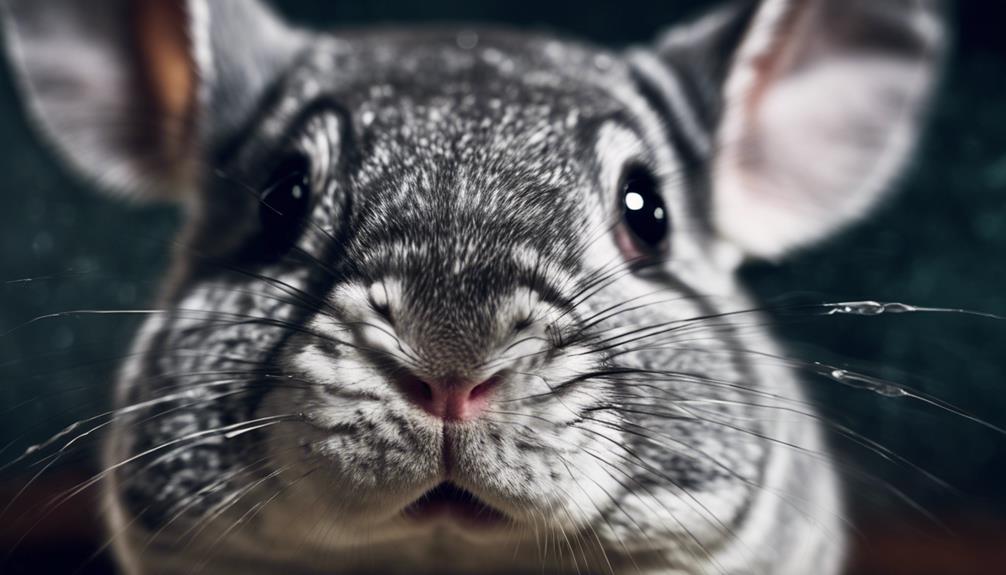
Chinchillas exhibiting eye or nose discharge may be displaying symptoms of underlying health issues that require timely veterinary assessment and treatment to safeguard their well-being. This discharge can be a sign of various health problems, and understanding the common causes and appropriate actions is crucial for chinchilla owners.
- Common Causes: Eye or nose discharge in chinchillas can stem from respiratory infections, allergies, dental issues, or even foreign bodies lodged in the nasal passages.
- Diagnostic Tests: A veterinarian may perform physical examinations, blood tests, or nasal swabs to determine the underlying cause of the discharge.
- Treatment Options: Depending on the diagnosis, treatment may involve antibiotics, antifungals, or surgical intervention to address the issue effectively.
- Prevention Measures: Maintaining a clean environment, ensuring proper ventilation, and providing a balanced diet can help prevent respiratory infections and related symptoms in chinchillas.
- Consulting a Veterinarian: If a chinchilla shows signs of eye or nose discharge, prompt veterinary consultation is essential to prevent potential complications and ensure the best possible outcome for the pet’s health.
Behavioral Changes
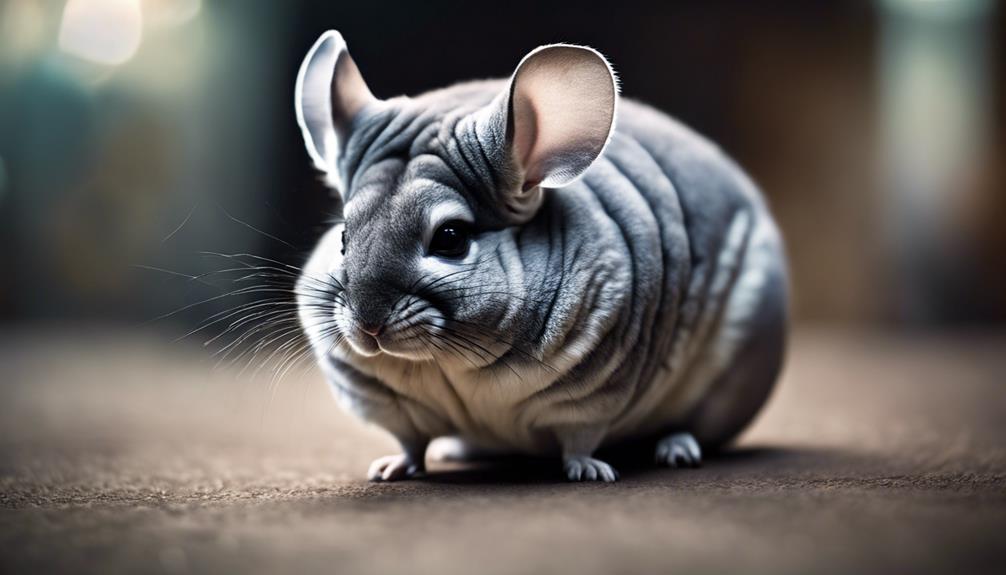
Changes in behavior can serve as crucial indicators of underlying health issues in chinchillas that necessitate prompt attention from a veterinarian. When observing your chinchilla, pay close attention to changes in social interactions and sleeping patterns. Chinchillas are social animals, so a sudden withdrawal from interaction with cage-mates or with their human caregivers could signal distress. On the other hand, unusually aggressive behavior can also be a red flag. Additionally, alterations in sleeping patterns, such as sleeping more or less than usual, or difficulty falling asleep, can indicate an underlying problem. The table below summarizes key behavioral changes to watch out for in your chinchilla.
| Behavioral Change | Possible Implication |
|---|---|
| Withdrawal from social interactions | Sign of distress or illness |
| Increased aggression | Could indicate discomfort or pain |
| Changes in sleeping patterns | Might suggest underlying health issue |
Frequently Asked Questions
Can Chinchillas Get Sick From Eating Certain Types of Food?
Chinchillas can get sick from certain types of food. Food allergies and toxic foods can cause health issues. It’s important to understand their dietary restrictions and offer safe treats to prevent any harmful reactions.
How Often Should I Take My Chinchilla to the Vet for Check-Ups?
On average, chinchillas should visit the vet at least once a year for check-ups. These visits are crucial for preventative care and health monitoring. Following vet recommendations can help ensure the well-being of chinchillas.
Are There Any Specific Vitamins or Supplements That Can Help Prevent Illness in Chinchillas?
Chinchillas have specific nutritional needs that, when met, can aid in illness prevention. Providing a balanced diet rich in high-quality hay, pellets, and occasional treats like dried fruits or herbs can help maintain their health.
Can Stress or Changes in Environment Contribute to Illness in Chinchillas?
Changes in environment or stress can impact chinchillas’ health. They may exhibit signs like decreased appetite or fur changes. To support their well-being, ensure a stable habitat, enrich their surroundings, and provide a calm atmosphere.
Are There Any Common Illnesses in Chinchillas That Owners Should Be Aware Of?
Chinchillas may develop common illnesses like dental problems, gastrointestinal issues, and respiratory infections. Preventive care includes regular dental checks, a balanced diet, and a clean living environment. Owners should monitor their chinchillas closely for signs of these conditions.











